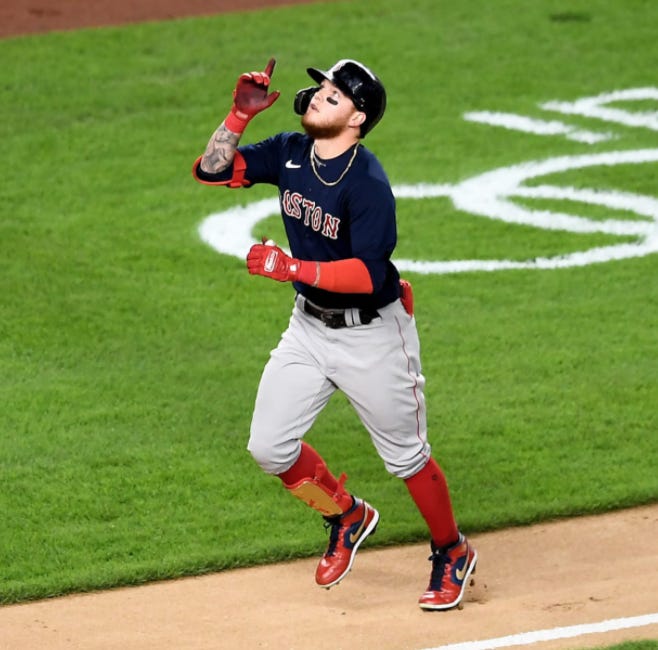Alex Verdugo is not Mookie Betts. It’s a point he made at a press conference last year after he was part of the package coming back from LA for the aforementioned MVP. The deal and the fact that they play the same position makes the comparisons difficult to avoid. He’s not wrong though. There are significant differences between the two going beyond the superficial. The biggest difference is there are no questions about Mookie Betts. None. There are questions about Alex Verdugo.
Asked about signing some of his players to contract extensions, GM Chaim Bloom addressed the question in predictably general terms, but admitted there had been internal discussions about the topic. Any list of potential extension candidates surely includes Verdugo who was the team’s second best player during the shortened 2020 season. The fact that Verdugo is the main player in the first and surely signature trade of the Bloom Administration probably helps push him up the list a bit as well.
He’s 24 and coming off of two very good years that saw him hit .300/.351/.476 with 18 homers over 159 games, almost exactly a full season’s worth. That’s pretty good! Why wouldn’t the Red Sox be interested in locking him up?
There are two reasons. The first is Verdugo’s role in a sexual assault in 2015. He was cleared of any wrongdoing but the reporting on the topic isn’t favorable to that interpretation of events. You can read more about what happened and his alleged part in it here. Verdugo was 19 at the time and a part of the Dodgers organization, so the Red Sox surely knew about this before the trade. Ideally anyone who participated in a sexual assault in any way would not now be a member of the Red Sox nor would they ever be, but that’s not the reality, clearly, if the reporting is accurate.
The second reason is something the Red Sox also likely know about which is Verdugo’s numbers. Let’s start with the good stuff. Verdugo seems to be a pretty good defensive outfielder. He gets good jumps on the ball, he has good speed in the outfield, and he has a good enough arm to play right field at Fenway, which is to say he has a good arm. He’s not Betts out there, but he’s clearly an above average defensive right fielder, even in Fenway’s odd and spacious right field, which is a valuable thing and not easily found.
At the plate, he’s quite good at putting the bat on the ball. He doesn’t strike out much in terms of today’s modern game where strikeouts are increasingly common. His strikeout percentage did jump to 20 percent in 2020, but again, abbreviated season, and he’s still under 16 percent for his career, including 13 percent in his only semi-full season, 106 games in 2019 with the Dodgers. And of course his actual numbers, his slash line, batting average and such, both last season and in 2019 were good.
Now we get to the other stuff. Last season Verdugo’s slash line was good, but his underlying metrics were not. He did not hit the ball hard, he did not generate much exit velocity off the bat, and he continued to hit the ball on the ground a ton, which limits power potential. Now, some of that is short season stuff. In 2019 with the Dodgers his exit velocity and hard hit percentages were league average, so considering his age and experience level, that’s certainly not bad, and indeed could be something to build on. His 2020 wasn’t the way to build on that though, even given it was only 60 games.
Take a look at his chart, courtesy of Baseball Savant (the numbers are percentile rankings and blue indicates poor performance).
Giving a long term contract to a guy coming off a season like that, one which saw him in the lower third in all relevant batted ball metrics would seem like a terrible idea. Obviously though 2020 represented a strange slice of baseball pie, one which effected players differently. It’s difficult to know which parts to count and which to ignore and which to count in some partial form. And his 2019 was better, not to mention he was 22 years old when it happened.
Those are the questions about Verdugo’s offensive game. He’ll be arbitration eligible next season, and under team control for three seasons beyond, so there’s really no reason for the Red Sox to give him a long term deal unless they think he’s about to break out and potentially make himself far more expensive than he would be in arbitration. Otherwise, going year-to-year with Verdugo, even if it means losing him to free agency in four years, seems the way to go.
There is one other point, which is that it’s possible the Red Sox can get him to hit the ball in the air more. He already has a big uppercut swing, and it’s not hard to imagine that being tweaked towards lifting the ball a bit. That’s far easier said than done, and given the COVID situation that kind of thing gets that much more complicated.
I remain optimistic about Verdugo’s performance, but that optimism stems more from the fact that the Red Sox obviously like him a lot and less from his actual numbers. If the Red Sox offer him a long term deal that will tell us a lot about what they think of the above percentiles and whether or not they consider them to be telling. That he’s on the team at all, let alone was the centerpiece of the trade for an MVP, tells us everything we need to know about how seriously the Red Sox take his sexual assault allegations.





